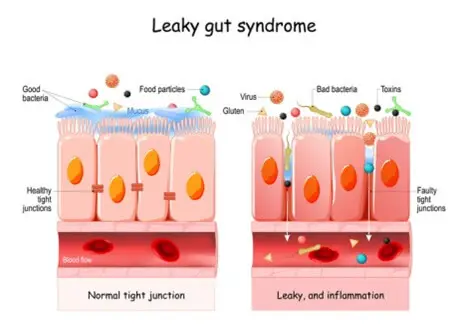Leaky Gut Protocol
Leaky Gut Protocol in Lansdowne, VA
Leaky Gut doesn’t happen overnight, but over time, from eating foods we are sensitive to, poor diet in general, gluten and numerous other factors, patients end up with abnormally large spaces in between the cells of the gut wall. These large spaces allow all sorts of toxic materials through and can cause a runaway reaction of inflammation and increased permeability. Leaky Gut Syndrome is a major issue and is associated with a number of autoimmune conditions and is involved in literally every patient with chronic illnesses like Lyme disease, mold toxicity, CIRS and neurodegenerative diseases like Alzheimer’s and Dementia.
Causes of Leaky Gut
- Medications (NSAIDS) like Ibuprofen and Motrin
- Microbial overgrowth or infection
- Parasite infections
- Fungal overgrowth (Candida)
- Ingestion of allergenic foods or foods you have a sensitivity to
- Poor digestion and absorption (pancreatic insufficiency or low HCl)
- Radiation therapy or chemotherapy
- Stress
- Aging
- IgA deficiency
- Chronic alcohol intake
- Excessive or strenuous exercise
- Inflammatory bowel disease – Crohn’s or Ulcerative colitis


Symptoms of Leaky Gut
Gas, bloating, diarrhea, constipation or generalized abdominal discomfort are some of the key symptoms. Leaky gut may also cause allergies and sensitivities that a patient has not had all along as well as lack of energy and fatigue. Hint — patients with more than a handful of severe and moderate food sensitivities usually have leaky gut.
How We Diagnose Leaky Gut
Diagnosing leaky gut is based on a combination of symptomatic expression and the results of specialized laboratory tests, including a food sensitivity test. Generally if a patient has more than a handful of severe sensitivities on any of the high-quality food sensitivity test panels, this is a good indication of leaky gut.
Treating Leaky Gut Syndrome
Our comprehensive functional medicine treatment plan consists of three steps. Treatment is typically over a 3-month period for mild cases and 6-9 months for severe cases.
Preparing and Eliminating
We start by eliminating the foods identified in your food sensitivity test to be severe or moderate. Patients should also eliminate NSAID-class medications if possible. This could mean even switching to a non-NSAID anti-inflammatory medication. Patients must also reduce or eliminate alcohol and strenuous exercise.
Implement the Leaky Gut Protocol
• Full spectrum Binder - We generally use Biotic Research GI Detox or Cell Core Biosciences Carboxy to reduce toxins and facilitate gut healing. • Probiotics are key to restoring gut health. We generally use Multibiome by Xymogen. • Digestive Enzymes help a damaged gut fully digest foods, which reduces the amount of partially digested, toxic particles affecting the intestinal lining. • Glutamine is an amino acid shown to be effective in healing leaky gut. • Quercetin stabilizes mast cells, reduces inflammation, and helps seal the leakiness.
Evaluate and retest
This final test consists of evaluating the patient for symptom elimination and retesting when healing appears to be complete. Healing will take between 3-9 months depending on severity of the condition and patient response.


